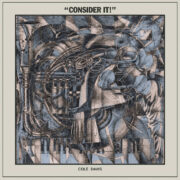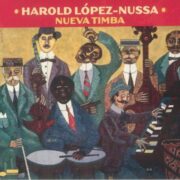Here are A.D. Amorosi’s monthly picks, coming to you the last Tuesday of the month.
 Cole Davis, Consider It! (Totally Gross National Product)
Cole Davis, Consider It! (Totally Gross National Product)
Upright bass–playing progeny of veteran trombonist Michael Davis, the Ron Carter Competition victor and NEA “Future Jazz Master” Cole Davis would’ve likely made this debut album of his into a post-post-bop thing, perfect for wine bars worldwide. Yet there’s something of the smartass in Davis, for the Lambchop bassist, instead of devotional jazz stalwartness, uses jazz like a root (and rude) tonic in a heady cocktail of processed and acoustic freak folk, swaggering lo-fi R&B, swollen ambient noise and attitude-laden hip-hop.
Warmly co-produced with Ryan Olson of Poliça, Davis’s album has loose, composed-yet-ramshackle improvisations including the fluid, clammily atmospheric melodies of “Beach Legs,” the green-eyed soul of “I Want You Gone” (featuring Bon Iver/Justin Vernon’s high whine) and the quietly orchestral hum (and fretless fingerings) of “Lonesome Position Indeed.”
With Davis’s fluttering bass flowing salty-and-smooth in the mix, his two most gorgeously arranged moments, “Gulls” and “All Family Matters,” highlight his rhythms, while offering standout roles to two of his costars. While trumpeter CJ Camerieri moves slowly alone through the silvery former, the same player joins saxophonist Michael Lewis and Davis’s dad, Michael Davis, for the latter, in a double-feature cinematic musical display that calls to Jerry Goldsmith’s Chinatown score.
 Harold López-Nussa, Nueva Timba (Blue Note)
Harold López-Nussa, Nueva Timba (Blue Note)
Beloved for his synth-soaked Timba a la Americana album from 2023 and its icy funk approximation of the hyperactivity of timba, Cuban-born pianist Harold López-Nussa plays more acoustically, and reverentially, on his newest album. Recorded live at Paris’s Le Duc des Lombards, the album shows its reverence and historicity on the classically imbued “Gitanerías,” from legendary Cuban orchestra composer Ernesto Lecuona.
You wouldn’t exactly call what Harold and his brother, drummer Ruy Adrian López-Nussa, do here chamber music. But if you can imagine a Cubano Bach-Werke-Verzeichnis jam on harpsicord and flamenco cajón — boom, you’re halfway there, with flair. Another Cuban master, big band leader Benny Moré, gets his flowers courtesy the pianist’s deconstruction of “Bonito y Sabroso” and its Fender Rhodes–filed electro-psych freakout (a futuristic fusion vibe that the pianist brings to his own original track, too, “Cerca y Lejos”). While Harold’ pianissimos are the brightest light within Nueva Timba, look to the generous helpings of harmonicat Grégoire Maret, whose breathy tones unexpectedly fill songs such as “Alma y Fuego” and ‘Bajista Guerrero” with a sense of immediacy and chance.
 Mulatu Astatke, Mulatu Plays Mulatu (Strut)
Mulatu Astatke, Mulatu Plays Mulatu (Strut)
Mulatu Astatke is to jazz in Ethiopia what Sun Ra is to jazz on Saturn: an inventive, interstellar composer-arranger who transmits his zig-zagging alien vibes to his home team and back again, with extra doses of native spice for frenetic flavoring. Using the vibraphone and the organ as principal instruments of communication, Astatke made his bones in Latin jazz and back-to-back 1966 debut albums Afro-Latin Soul, Volumes 1 & 2, before changing his game to his newly coined sound, “Ethio-jazz,” at the top of the 1970s.
Mulatu Plays Mulatu, his first new album in over 10 years, finds the genius instrumentalist splitting the difference between those worlds while streaming through the offshoots of Jupiter for the Pharoah Sanders–like “Netanet” and the deep, slow swell of “Zèlèsègna Dèwèl,” with its flutey, bee-buzzing, Bowie-Blackstar attack. Don’t ignore my use of the word “swell,” as that track, along with “Motherland” and the album’s closer, “Yèkatit,” sound as if they are breathing great heaving chestfuls of air as they unfurl. And just for the heck of it, “Kulun” sounds like what would what have happened if the producers of The Odd Couple decided to scrap Neal Hefti’s polite orchestrations for Astatke’s oblong, rough-and-tumble brand of jazz.
 Pateka, Pateka (Joyful Services)
Pateka, Pateka (Joyful Services)
In their time as Aaron Space & his Terrestrial Underlings, San Francisco keyboardist-singer Elihu Knowles and his renowned band crafted some of the freest avant-garde post-rock since the days of the Mothers of Invention. To that end, Knowles, his Bay Area buddies and saxophonist-flautist-EWI player Hayden Dekker move the rock to the background, amp up their wonky, glittering jazz quotient to 11 and welcome liberal, equitable doses of Californian-cool vocal harmony, open chord passages, skronk and the vaguely Tropicálian feel of Os Mutantes to their new ensemble’s debut full album.
Skittering drums, gurgling bass and uneasily subtone-breathy saxophones back Knowles’s voice — itself heavily fx-processed to sound lava lamp–like — and fill up songs such as the majestic “Café Chroma,” the spacious, snake-charming “Odwalla” (nice EWI use) and its noisier brethren “Gnome’s Orchard.” Particularly warped sounding, in the literal and figurative sense, are the altogether-too-brief “Loss” and the misleadingl -titled “Rock Night,” two moments of undefinable, opposite-polarity bliss and wonk. JT
